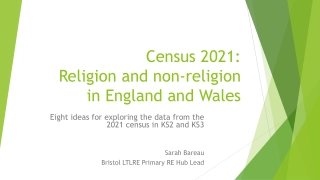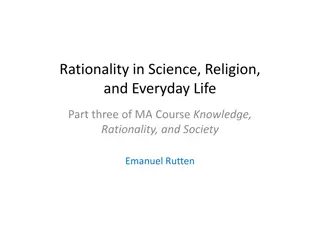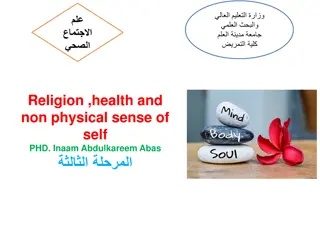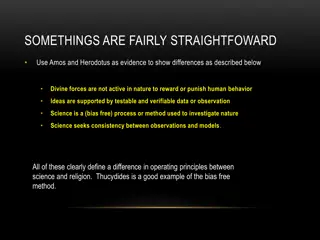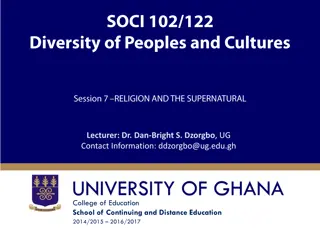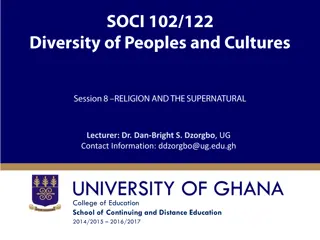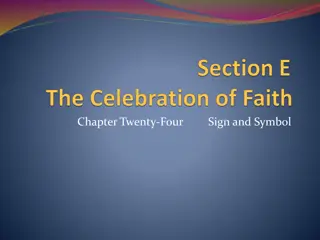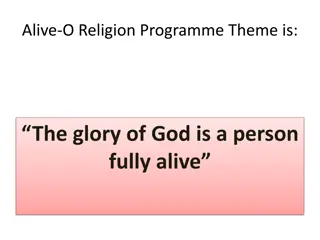Understanding the Role of Language in Religion
Exploring the significance of language in religious contexts, this content discusses the functions, features, lexicon, grammar, and metaphorical aspects present in religious language. It delves into how religious language upholds spiritual beliefs, persuades believers, and expresses specific attitudes. Additionally, it highlights the use of archaic vocabulary, unique grammar forms, and metaphorical techniques in religious texts.
Download Presentation

Please find below an Image/Link to download the presentation.
The content on the website is provided AS IS for your information and personal use only. It may not be sold, licensed, or shared on other websites without obtaining consent from the author. Download presentation by click this link. If you encounter any issues during the download, it is possible that the publisher has removed the file from their server.
E N D
Presentation Transcript
Language and Religion
Functions of Religious Language Upholding spiritual belief Persuade people to believe and to act in a certain way Expressive Prescribe a specific attitude to life
Features of Religious Language Doctrine sustains and promotes its particular spiritual wisdom Prayers are a special form of polite command/request addressed to God Liturgies chants, thanksgivings, hymns, psalms Sermons are moral statements which aim to dictate a certain kind of behaviour through stories/examples Theological texts are discursive documents with a moral purpose including justifications, guidelines or explanations of religious teachings
Lexis Subject specific: Nouns disciples, parables Verbs pray, forgive Vocabulary is often archaic Formal phrases/idioms e.g. In the beginning Formulaic e.g. Amen to mark end of prayer Antithesis is common e.g. heaven and hell Naming of the godhead e.g. Lord/God/Allah Modifiers e.g. Almighty Determiners are often possessive e.g. God s love Abstract nouns e.g. heaven, salvation
Grammar Third person singular verbs inflected with suffixes e.g. (e)th, -(e)st (creepeth, mayest) Some verbs still have older strong forms e.g. sware for swore, spake for spoke Do-periphrasis (emphasis) e.g. I did eat Present tense is often used to be advisory Verb mood is often declarative and imperative (instructional) e.g. Give heed unto this reading Modal auxiliary verbs e.g. We may eat of the fruit Initial position conjunction e.g. And the Lord said
Metaphorical Language Metaphor adds an extra layer of meaning to stories that provide spiritual philosophy Personification e.g. the voice of the Lord God walking in the garden Symbolism is central to interpretation e.g. Adam and Eve = humanity; serpent = evil; apple = temptation Rhetoric (persuasion) through techniques such as antithesis Phonological patterning e.g. division of texts into verses (sonorous/resonant tone)
To what extent is religion viewed as a joke or as entirely fictitious?
10 Commandments: King James Bible You shall have no other gods before Me. You shall not make for yourself a carved image any likeness of anything that is in heaven above, or that is in the earth beneath, or that is in the water under the earth; 5 you shall not bow down to them nor serve them. For I, the LORD your God, am a jealous God, visiting the iniquity of the fathers upon the children to the third and fourth generations of those who hate Me, 6 but showing mercy to thousands, to those who love Me and keep My commandments. You shall not take the name of the LORD your God in vain, for the LORD will not hold him guiltless who takes His name in vain. Remember the Sabbath day, to keep it holy. 9 Six days you shall labour and do all your work, 10 but the seventh day is the Sabbath of the LORD your God. In it you shall do no work: you, nor your son, nor your daughter, nor your male servant, nor your female servant, nor your cattle, nor your stranger who is within your gates. 11 For in six days the LORD made the heavens and the earth, the sea, and all that is in them, and rested the seventh day. Therefore the LORD blessed the Sabbath day and hallowed it. Honour your father and your mother, that your days may be long upon the land which the LORD your God is giving you. You shall not murder. You shall not commit adultery. You shall not steal. You shall not bear false witness against your neighbour. You shall not covet your neighbour s house; you shall not covet your neighbour s wife, nor his male servant, nor his female servant, nor his ox, nor his donkey, nor anything that isyour neighbour s. 1. 2. 3. 4. 5. 6. 7. 8. 9. 10.


